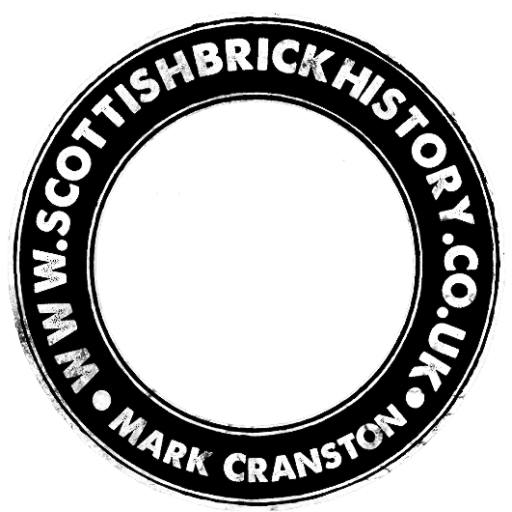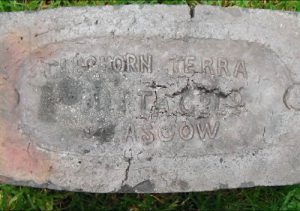These examples were all found on the old Cleghorn Brickworks site.
None are marked Cleghorn but until evidence suggests otherwise, I am happy to tag them as being manufactured at the Cleghorn Works.
See the attached catalogue for similar examples – Click me
Cleghorn Brickworks, Cleghorn, Lanarkshire.
Below – 2 photos of a long tapered brick. It is marked .L. to the widest end. It may have had more lettering but unfortunately the end is chipped.
19″ long, 4 1/4″ wide. and it tapers from 2 1/2″ to 2 1/4″

.

Below – an unusual stable or byre block as the cobble effect top is on the side face of the brick. 9″ long, 4″ deep and 3 1/4″ wide.

Below – unmarked with an unusual ‘dumbell’ frog.

Below – an ornate ‘return block’ – 8 3/4″ x 8 3/4″ x 4 1/2″

Below – a moulded brick – 9″ long x 4 1/2″ wide x 3 1/4″ high

Below – a moulded brick – 9″ long x 6 1/2″ wide x 3 1/4″ high

Below – an ornate ‘return block’ – 9 1/2″ x 9 1/2″ x 3 1/4″

Below – a 90 degree roof ridge found at the Cleghorn site by Mat Lupton.

Below – a 115 degree roof ridge found at the Cleghorn site. The bottom example is intact bar the roll top but I have laid a similar roll top above it in order to show what the whole tile would have looked like.

Below – a 75 degree roof ridge found at the Cleghorn site.

.

Below – examples of paver or byre blocks.
 .
. 
.

Below – the fire brick found at this location were predominantly either marked Caledonia or Hurll / Hurll Glasgow. Early fire bricks marked Gartliston Fire Clay Works (Hurll) were also found.

Below – A brick which just shows how hot the kilns can get. This example shows how a brick can melt!

Below – a brick marked Cleghorn Terra Cotta Co Ltd Glasgow. This is an elongated example with a semi circular design to one end.















 .
. 











